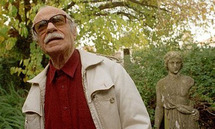
Writer Sabato
The writer's best known work, "The Tunnel," was a first novel published in 1948 that deals with the existential search for self and identity.
Other novels, including "On Heroes and Tombs" (1962) and "The Angel of Darkness" (1974), also became part of the cannon of Latin American literature.
But he also earned tremendous respect for leading a ground-breaking probe into abuses under the country's 1976-1983 military dictatorship, and for his essays examining the tensions between technology and humanism.
A wake held late Saturday was extended into Sunday in Buenos Aires, where he lived for 60 years and was lauded equally by the nation's leaders and residents with whom he played games of dominoes at a local athletic club.
His youngest son Mario, a filmmaker, quoted Sabato as saying he wanted his wake to be held in the club "so that the people of the barrio can accompany me on my final voyage, and I want them to remember me as a neighbor, a curmudgeon at times but basically a good guy."
Shortly after his death, dozens of neighbors came to the modest house where the writer lived and left flowers on the garden gate. The office of President Cristina Kirchner sent a wreath, and several other dignitaries paid respects.
"He was the greatest," said Ricardo Alfonsin, a presidential candidate from the Radical Civic Union whose father Raul Alfonsin was president in the 1980s and nominated Sabato to head the National Commission for the Disappearance of Persons (Conadep).
Right-wing Buenos Aires mayor Mauricio Macri, himself a possible presidential candidate, said "Argentines lost a great writer and a constant fighter for human rights."
Sabato was a physicist who trained at top institutes in France and the United States but turned away from science to become a writer and political iconoclast bucking the country's authoritarian regimes.
He was forced out of a university teaching job in the 1940s under the dictatorship of Juan Domingo Peron, and was removed as director of a prominent journal under the military regime that took the helm from Peron.
In 1984, he led Conadep, which investigated the human rights abuses committed under the military dictatorship during its "dirty war" against the left.
The result was a powerful account, replete with eyewitness testimony, of the country's descent into barbarism. It was titled "Nunca Mas," or "Never Again."
That same year, Sabato was awarded the Cervantes Prize for Literature, the most prestigious in the Spanish-speaking world.
Elvira Gonzalez Fraga, the writer's partner of 30 years, said Sabato had been in failing health for three years and died of a pulmonary ailment.
------------------------------------------------------------------------------------------
Other novels, including "On Heroes and Tombs" (1962) and "The Angel of Darkness" (1974), also became part of the cannon of Latin American literature.
But he also earned tremendous respect for leading a ground-breaking probe into abuses under the country's 1976-1983 military dictatorship, and for his essays examining the tensions between technology and humanism.
A wake held late Saturday was extended into Sunday in Buenos Aires, where he lived for 60 years and was lauded equally by the nation's leaders and residents with whom he played games of dominoes at a local athletic club.
His youngest son Mario, a filmmaker, quoted Sabato as saying he wanted his wake to be held in the club "so that the people of the barrio can accompany me on my final voyage, and I want them to remember me as a neighbor, a curmudgeon at times but basically a good guy."
Shortly after his death, dozens of neighbors came to the modest house where the writer lived and left flowers on the garden gate. The office of President Cristina Kirchner sent a wreath, and several other dignitaries paid respects.
"He was the greatest," said Ricardo Alfonsin, a presidential candidate from the Radical Civic Union whose father Raul Alfonsin was president in the 1980s and nominated Sabato to head the National Commission for the Disappearance of Persons (Conadep).
Right-wing Buenos Aires mayor Mauricio Macri, himself a possible presidential candidate, said "Argentines lost a great writer and a constant fighter for human rights."
Sabato was a physicist who trained at top institutes in France and the United States but turned away from science to become a writer and political iconoclast bucking the country's authoritarian regimes.
He was forced out of a university teaching job in the 1940s under the dictatorship of Juan Domingo Peron, and was removed as director of a prominent journal under the military regime that took the helm from Peron.
In 1984, he led Conadep, which investigated the human rights abuses committed under the military dictatorship during its "dirty war" against the left.
The result was a powerful account, replete with eyewitness testimony, of the country's descent into barbarism. It was titled "Nunca Mas," or "Never Again."
That same year, Sabato was awarded the Cervantes Prize for Literature, the most prestigious in the Spanish-speaking world.
Elvira Gonzalez Fraga, the writer's partner of 30 years, said Sabato had been in failing health for three years and died of a pulmonary ailment.
------------------------------------------------------------------------------------------









 Home
Home Politics
Politics









